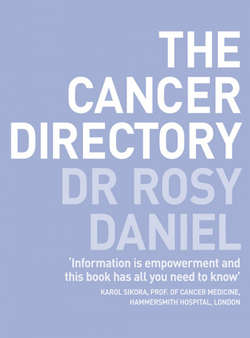Читать книгу The Cancer Directory - Dr. Daniel Rosy - Страница 53
A Framework for Setting Up a Personal Support Group
ОглавлениеA personal support group is being set up by ________________.
I have cancer, and need ongoing emotional support and a ready source of practical help at times of crisis. I will also be very happy to provide support for other group members when I am able to do so, but this may not be possible all the time, and will depend on the demands of this illness and its treatment. I would like to invite you to join the group. Please think about the following suggestions for how the group will be run before saying ‘yes’ to joining. Perhaps you will want to make some suggestions of your own, too? I believe that:
• The group should ideally comprise a minimum of six people besides me, who are not themselves seriously ill at this time. It can include family members, but there should be as many or more non-family members if possible.
• The group members should be able to spare at least two hours every month to come to a group meeting, and have some extra time free each month to provide some care or practical help as needed.
• Ideally, none of this group should be involved with me professionally so that there is no risk of breaking confidentiality or compromising their professionalism.
• At each meeting, it is recommended that each person in the group take 10 minutes – entirely uninterrupted – to tell the others first how they feel, what they are having to deal with and then the support they would ideally like in the following month. The voicing of the support required is not necessarily an active request so much as an opportunity for each person to formulate and voice their needs.
• The time taken by each group member can be lengthened or shortened, depending on the time available and the group members wishes – even three minutes each can be highly effective.
• If possible, members should try hard not to jump in and try to ‘fix’ the way someone is feeling with practical solutions or advice, as this may shut them down emotionally, stopping them from having a good cry or rant. A great deal of the value of the group will be in supporting each other to express our feelings, and its effectiveness will depend greatly on the ability of the group to sit and bear witness to the others’ distress without trying to make them feel better immediately. It is important to think about whether this is possible for you.
• It will be important to keep the group to time. It can be helpful to pass a watch around to be held by the person talking, or for one person to keep time and gently ring a small cymbal or bell when the time is up.
• After the initial go around the group (which will take about an hour for six people), we can then move into practical mode, looking at the practical possibilities for the group to offer each other help in the forthcoming month.
As you prepare for and go through treatment, and then embark upon your recovery process, your wider support network will then also include the holistic therapists you take on to help you.
Your support network will give you great security as the days go by and, even if not needed all the time, will give you a tremendous resource to call upon if things get difficult at any point.
